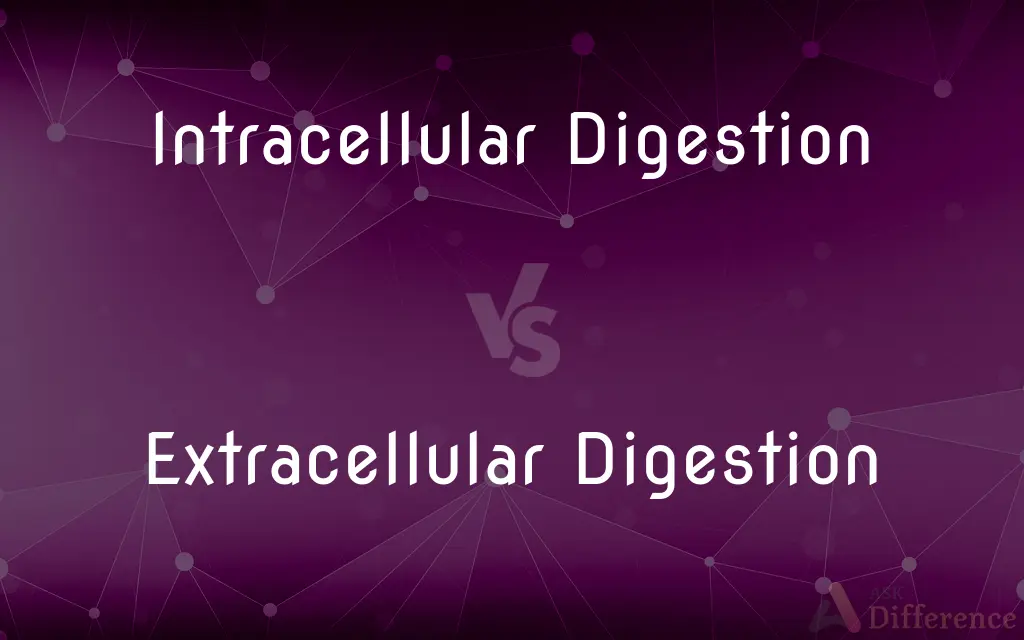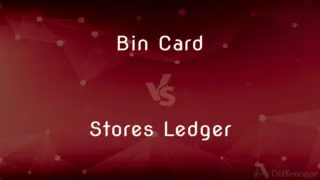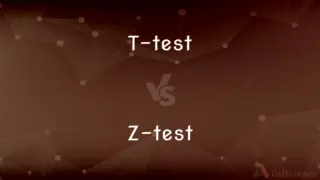Intracellular Digestion vs. Extracellular Digestion — What's the Difference?
By Tayyaba Rehman — Published on December 14, 2023
Intracellular Digestion occurs within cells, while Extracellular Digestion happens outside cells.

Difference Between Intracellular Digestion and Extracellular Digestion
Table of Contents
ADVERTISEMENT
Key Differences
Intracellular Digestion involves the breakdown of nutrients within cellular organelles. It primarily occurs in lysosomes where enzymes digest cellular waste and nutrients. Intracellular Digestion is typical in unicellular organisms, where digestion must occur within the single cell they possess.
Extracellular Digestion, in contrast, happens outside cells. It involves the secretion of enzymes into the environment or digestive system to break down food before absorption. This type of digestion is common in multicellular organisms, allowing for the digestion of complex substances.
Intracellular Digestion requires nutrients to be brought into the cell. This process is crucial for cellular metabolism and energy production. It also helps in recycling cellular components through processes like autophagy.
Extracellular Digestion allows for the breakdown of large food particles that cannot enter cells directly. It facilitates nutrient absorption by converting complex molecules into simpler ones, which are then taken up by cells.
Intracellular Digestion is a more direct and contained process, usually involving less complex organisms. It is a fundamental aspect of cellular function and maintenance.
ADVERTISEMENT
Extracellular Digestion is part of a more complex system, often involving specialized organs and tissues. It reflects the advanced strategies of multicellular organisms in nutrient acquisition.
Comparison Chart
Location
Inside cells
Outside cells
Process
Enzymatic breakdown within organelles
Enzymatic breakdown in the environment or digestive system
Organisms
Common in unicellular organisms
Typical in multicellular organisms
Function
Nutrient absorption, cellular waste management
Breakdown of complex food substances
Complexity
Direct, contained
Involves specialized organs or tissues
Compare with Definitions
Intracellular Digestion
Intracellular Digestion is the breakdown of substances within the cell.
Amoebas utilize intracellular digestion to process their food.
Extracellular Digestion
It involves enzyme secretion into the digestive system.
Human digestion begins with extracellular processes in the mouth.
Intracellular Digestion
This process encompasses cellular absorption and digestion.
Intracellular digestion occurs within a paramecium’s vacuoles.
Extracellular Digestion
This process breaks down complex food into absorbable units.
Extracellular digestion in the stomach breaks down proteins.
Intracellular Digestion
It's the enzymatic digestion within cellular compartments.
Intracellular digestion is crucial for cellular homeostasis.
Extracellular Digestion
Extracellular Digestion is the breakdown of food outside cells.
Fungi exhibit extracellular digestion by releasing enzymes.
Intracellular Digestion
It's a cellular process involving lysosomal enzymes.
Intracellular digestion helps cells recycle damaged organelles.
Extracellular Digestion
It's the enzymatic decomposition of food in external spaces.
Snakes rely on extracellular digestion to liquefy their prey.
Intracellular Digestion
Intracellular Digestion involves nutrient processing inside cells.
Intracellular digestion is key for single-celled organisms’ survival.
Extracellular Digestion
Extracellular Digestion happens in the organism's external environment.
Extracellular digestion allows earthworms to process soil nutrients.
Common Curiosities
Are enzymes involved in both Intracellular and Extracellular Digestion?
Yes, both processes involve enzymes, but they act in different locations.
What is Intracellular Digestion?
It's the breakdown of substances within a cell's internal structures.
Does Extracellular Digestion require specialized organs?
In multicellular organisms, it often involves specialized digestive systems.
Which organisms primarily use Intracellular Digestion?
Single-celled organisms and some multicellular organisms on a cellular level.
Can Extracellular Digestion occur in unicellular organisms?
Rarely, as most rely on Intracellular Digestion due to their size.
Is Intracellular Digestion linked to autophagy?
Yes, it’s involved in recycling cellular components.
How do nutrients enter cells after Extracellular Digestion?
Through absorption mechanisms in the cell membrane.
Are lysosomes involved in Intracellular Digestion?
Yes, they contain enzymes for this process.
Where does Extracellular Digestion occur?
It occurs outside cells, in the digestive system or the external environment.
Can Intracellular Digestion handle large food particles?
No, it’s suited for smaller molecules and internal cellular components.
Is Intracellular Digestion a complex process?
It’s less complex than Extracellular but crucial for cellular functions.
Does Extracellular Digestion aid in energy production?
Indirectly, by breaking down food into absorbable nutrients.
Is Intracellular Digestion faster than Extracellular Digestion?
Not necessarily, as it depends on the organism and the substance being digested.
What role does the stomach play in Extracellular Digestion?
It secretes enzymes and acids for food breakdown.
Do plants exhibit Extracellular Digestion?
Some do, like carnivorous plants digesting insects externally.
Share Your Discovery

Previous Comparison
Bin Card vs. Stores Ledger
Next Comparison
T-Test vs. Z-TestAuthor Spotlight
Written by
Tayyaba RehmanTayyaba Rehman is a distinguished writer, currently serving as a primary contributor to askdifference.com. As a researcher in semantics and etymology, Tayyaba's passion for the complexity of languages and their distinctions has found a perfect home on the platform. Tayyaba delves into the intricacies of language, distinguishing between commonly confused words and phrases, thereby providing clarity for readers worldwide.












































